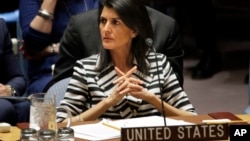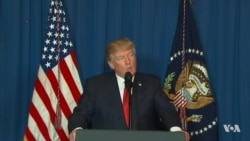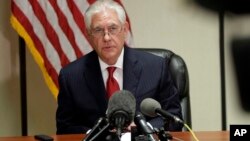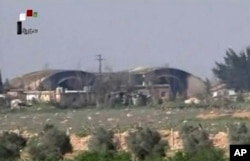The U.S. ambassador to the United Nations is suggesting if President Donald Trump needs to carry out more military strikes on Syria, he will.
"He will not stop here," Ambassador Nikki Haley told CNN on Sunday. "If he needs to do more, he will."
But Haley and Secretary of State Rex Tillerson gave mixed signals on the priority of removing Syrian President Bashar al-Assad from power.
"There's not any sort of option where a political solution is going to happen with Assad at the head of the regime," Haley said. "If you look at his actions, if you look at the situation, it's going to be hard to see a government that's peaceful and stable with Assad.
"Regime change is something that we think is going to happen," she said.
Watch related video by VOA's Michael Bowman:
But Tillerson said defeating Islamic State is still the paramount U.S. goal in Syria.
"It's important that we keep our priorities straight," Tillerson told CBS's "Face the Nation." "And we believe that the first priority is the defeat of ISIS," an acronym for the Islamic State group.
"Once the ISIS threat has been reduced or eliminated," Tillerson said, "I think we can turn our attention directly to stabilizing the situation in Syria."
The top U.S. diplomat added, "We're hopeful that we can prevent a continuation of the civil war and that we can bring the parties to the table to begin the process of political discussions" between the Assad government and various rebel groups trying to overthrow the Damascus regime.
Syria resumes airstrikes
On Saturday, Syrian warplanes resumed flights from an air base targeted in Friday's U.S. cruise missile attack, according to a provincial governor who said the base was operating from what he described as "a first phase."
The comments from Homs provincial Governor Talal Barazi came just hours after the Syrian government said the U.S. missile attack on the Shayrat air base had caused extensive damage.
Barazi did not offer further details, and the U.S. Defense Department referred questions about conditions at the air base to the Damascus government.
Monitors from the British-based Syrian Observatory for Human Rights earlier said Syrian warplanes were able to take off from the base Friday and struck rebel targets in eastern parts of the province.
It was not clear whether planes from Shayrat participated in strikes Saturday that killed at least 18 civilians near the small city of Sheikhoun. That city was hit early last week by chemical weapons that U.S. authorities say were fired by Syrian warplanes, sparking an international outcry and the U.S. cruise missile retaliation three days later. Russia says that a conventional airstrike hit a rebel depot containing "toxic substances."
The Observatory said the Saturday strikes may have been carried out by Russian warplanes, which began backing Syrian military operations last year.
Trump: runways not primary targets
Trump ordered the missile strikes on Shayrat after rescue workers said at least 100 people were killed and hundreds of others wounded in the chemical strikes at Sheikhoun.
Trump later suggested on Twitter the Shayrat runways had not been the primary missile targets. He did not elaborate, other than to note that runways are easily and quickly repaired.
A U.S. Navy admiral said the missile strikes had destroyed the ability of the Syrian military to launch chemical strikes from the base. Admiral Michelle Howard, who heads U.S. naval forces in Europe and Africa, told Reuters U.S. forces are prepared to carry out further strikes if needed.
Assad's government has repeatedly denied using chemical weaponry in its fight against rebels seeking to topple the Damascus regime.
Idlib under rebel control
Idlib province is largely controlled by a rebel alliance that includes al-Qaida-linked fighters who have battled to oust the Damascus government for most of the past six years. Idlib's rebel population has swelled in recent months, due largely to a series of agreements with Damascus allowing rebels safe passage to the province from other areas of the country.
The province remains a primary target Syrian and Russian jet fighters.
In related developments, Syria's state news agency SANA said Saturday hundreds more Syrian rebels and their families have left the last opposition-held neighborhood in the central city of Homs, under a Russia-brokered deal granting them safe passage to other areas of the country.
Saturday's evacuations are the fourth set of rebel withdrawals from Homs, under the deal negotiated in early February.








